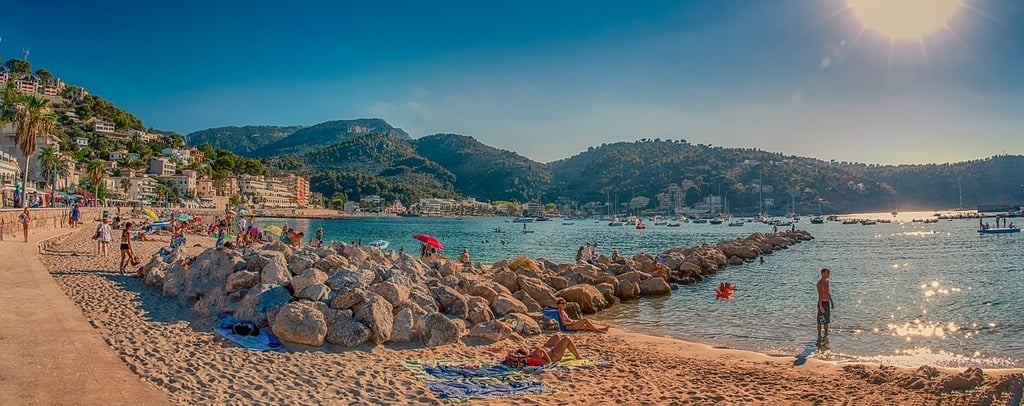Business
Majorca Sees 20% Drop in Tourism Amid Protests and Backlash

Majorca, a prominent holiday destination in Spain, has experienced a significant decline in tourism, with reports indicating a 20% drop in visitors in July compared to the same month last year. This downturn follows a series of anti-tourism protests that have swept across the island, causing economic distress for local bars, restaurants, and excursion providers.
The Balearic Islands Employers Association (CAEB) has reported a sharp decrease in revenues for bars and restaurants, while beach operators noted a worrying decline in customer numbers. Popular areas such as Sóller, Capdepera, and Palma have seen up to a 40% reduction in patrons, prompting urgent calls from local business leaders for reform and reassurance aimed at potential tourists.
Activists from grassroots groups, particularly SOS Residentes, have voiced stark concerns about the island’s heavy reliance on tourism. One activist remarked to The Telegraph, “Today, the only future for young people is to work as a waiter or in tourism… But tourism is an easy way to earn money, and the easy way will kill us all.” Their frustrations stem from what they describe as a “tourism monoculture,” which benefits investors while leaving local wages stagnant and displacing communities.
While protests have gained attention, they mainly target government policies rather than individual tourists. The Palma Airport Info site noted that these demonstrations reflect local anger at policies prioritizing profit over residents’ quality of life. Since 2023, protests led by groups like Menys Turisme, Més Vida have intensified, with residents employing various tactics, including erecting fake danger signs and staging public dinners, to express their discontent with mass tourism.
In response to the protests, the Hotel Business Federation (FEHM) has initiated a campaign titled “Tourist, Go Home Happy,” deploying posters and digital banners intended to welcome visitors and mitigate protest sentiments. However, the impact on local businesses has been immediate and severe, with the Restaurants Association in Mallorca warning that some establishments may close by year-end due to dwindling foot traffic.
The association representing beach concessions, Adopuma, has criticized protest organizers for fostering hostility toward visitors, particularly targeting British tourists, who form a significant portion of the island’s tourism market. They stated, “The island’s economy is being pushed to breaking point,” emphasizing that September is critical for salvaging the tourist season.
Despite the ongoing turmoil, Majorca remains a popular destination. Jaume Bauzà, the Tourism Minister, insists that overall visitor numbers remain high. A communications campaign has been launched to assure potential holidaymakers that the island is still welcoming and safe. However, the divide between residents and policymakers deepens, as activists advocate for a shift towards “higher-quality” tourism that prioritizes economic and cultural value over sheer numbers.
In June 2023 alone, approximately 10,000 individuals participated in protests in Palma, echoing similar sentiments from previous years with the slogan, “Less tourism, more life.” As Majorca navigates the consequences of these protests, the debate surrounding its future intensifies. The island, known for its stunning beaches and vibrant nightlife, finds itself at a crossroads, grappling with issues of sustainability, identity, and the true cost of paradise.
-

 Entertainment2 months ago
Entertainment2 months agoAnn Ming Reflects on ITV’s ‘I Fought the Law’ Drama
-

 Entertainment3 months ago
Entertainment3 months agoKate Garraway Sells £2 Million Home Amid Financial Struggles
-

 Health2 months ago
Health2 months agoKatie Price Faces New Health Concerns After Cancer Symptoms Resurface
-

 Entertainment2 months ago
Entertainment2 months agoCoronation Street’s Carl Webster Faces Trouble with New Affairs
-

 Entertainment2 months ago
Entertainment2 months agoWhere is Tinder Swindler Simon Leviev? Latest Updates Revealed
-

 Entertainment3 months ago
Entertainment3 months agoKim Cattrall Posts Cryptic Message After HBO’s Sequel Cancellation
-

 Science3 weeks ago
Science3 weeks agoBrian Cox Addresses Claims of Alien Probe in 3I/ATLAS Discovery
-

 Entertainment2 months ago
Entertainment2 months agoOlivia Attwood Opens Up About Fallout with Former Best Friend
-

 Entertainment3 months ago
Entertainment3 months agoMarkiplier Addresses AI Controversy During Livestream Response
-

 Entertainment3 months ago
Entertainment3 months agoMasterChef Faces Turmoil as Tom Kerridge Withdraws from Hosting Role
-

 Entertainment4 months ago
Entertainment4 months agoSpeculation Surrounds Home and Away as Cast Departures Mount
-

 World2 months ago
World2 months agoCole Palmer’s Mysterious Message to Kobbie Mainoo Sparks Speculation





















